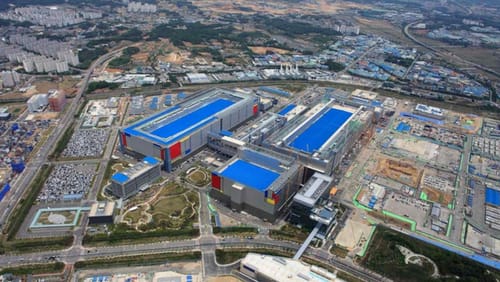 |
| South Korea and Taiwan feature slices |
Intel America announced earlier that it plans to spend $ 20 billion building two new chip manufacturing facilities in Arizona by 2024.
But even if it can prevent the growing influence of China on the global supply chain, it will still be vulnerable to the power of Samsung in South Korea and TSMC in Taiwan.
An IC Insights research report shows that Intel's market size of $ 20 billion is insufficient to compete with these Asian giants.
The report notes that governments must spend at least $ 30 billion annually for at least five years to have a fair chance of success.
This shows that the US, China, and the European Union need to set minimum costs for chip makers that are comparable to Samsung and TSMC in terms of production technology and capacity.
Due to the high cost of building factories, chip makers other than Samsung and TSMC remain vigilant in capital investments.
According to IC Insights' report, Samsung was the most expensive company in the world as of 2010, while Intel can only catch up with TSMC, which comes in second.
Samsung and TSMC are expected to account for 43% of the total global investment this year.
Samsung and TSMC have dominated the global chip industry for the past two decades, and the recent auto chip crisis has been a negative effect of the monopoly.
Although Intel's huge investment is driven by the competition between China and the United States, Intel's strategy must also be to bridge the gap between the two largest companies.
For China, IC Insights estimates it will save $ 30 billion annually for at least five years, which is an ambitious goal.
Since 2014, the public and private sectors in China have worked together to drive the development of the industry. However, the domestic chipmakers invested only $ 44.7 billion between 2017 and 2020.
In the same period, Samsung's investment nearly doubled.
IC Insights' report says that while the money could be used in China, the business dilemma preventing the country from purchasing certain key process equipment will definitely hinder the development of the chip makers.
Japan's Ministry of Economy, Trade and Industry has pledged to lure foreign chip makers to make advanced semiconductors in the country, but these efforts are unlikely to bear fruit.
TSMC plans to invest about $ 189 million to build research and development facilities in northeastern Tokyo, but the funds are a small amount for the company.
As geopolitical risks mount, the major chip makers in the United States, China, South Korea and Taiwan are unlikely to struggle to build large plants in Japan.
Japan is expected to focus on chipmaking equipment and materials and the region continues to have a competitive advantage.
